2011 年 11 月湖南成人学士学位英语真题及答案
Part I Dialogue Completion (15 points)
Directions: There are 15 short incomplete dialogues in this part, each followed
by 4 choices marked A, B, C and D .Choose the best one to complete the dialogue
and mark your answer on the ANSWER SHEET with a single line through the center.
1. Speaker A: Would you please pass the salt?.
Speaker B: __________ But don’t put too much of it in the soup.
A. Here you are.
B. There you go.
C. I sure do.
D. My pleasure.
2. Speaker A: Good evening, George. Come in. How have you been?
Speaker B: __________.
Speaker A: Oh, reasonably well.
A. Just fine, thank you.
B. Well yes, thanks.
C. Could be better, thanks.
D. Nice, thank you.
3. Speaker A: I’d like to have my phone disconnected?
Speaker B:__________
Speaker A: Well, I’m moving to California for a new job there.
A. Give me a reason!
B. You do?
�
C. Why is that?
D. May I ask why?
4. Speaker A: Is Mrs. Johnson joining us for dinner?
Speaker B: __________Why did you ask?
Speaker A: I’d like her to try some Chinese food.
A. Not as I know.
B. Never mind.
C. Not that I know of.
D. She is not.
5. Speaker A: By the way, do you know how to use chopsticks?
Speaker B: That’s easy.
Speaker A: __________
Speaker B: I was stationed in China for five years, you know.
A. It is amazing!
B. Why did you say that?
C. It was impossible.
D. How did you learn to use them?
6. Speaker A: Are you ill?
Speaker B: __________. I’m just tired.
A. It’s all right.
B. Exactly.
C. Not really.
�
D. Don’t mention it.
7. Speaker A: Are you hungry?
Speaker B: Hungry? __________
Speaker A: So let’s go to the Italian restaurant near here.
A. I’m starving.
B. I don’t know.
C. Not yet.
D. It’s not my topic.
8. Speaker A: How about the professor’s lecture?
Speaker B: I find it very difficult to follow. __________
A. It’s so inspiring.
B. It’s beyond me.
C. It’s so interesting.
D. It’s not my topic.
9. Speaker A: Let’s go to the movies in Prickly tomorrow.
Speaker B: Ok, where should we meet?
Speaker A:__________---name the place and I’ll pick you up.
A. I’ll let you know.
B. I’ll tell you what.
C. You know what.
D. You just say it.
10. Speaker A: Were you planning to stop by the supermarket?
�
Speaker B: Yes. Would you like me to get you anything?
Speaker A: A loaf of bread, __________.
A. if any
B. if you like
C. if I were you
D. if you don’t mind
11. Speaker A: Do you have any job openings?
Speaker B: No, but if you fill out an application, __________.
A. we can keep it on file for a year
B. we can put it on notice
C. we’ll see what happens
D. we’ll call you when we have time
12. Speaker A: Hi, Russ. We are having a bit of trouble with the car, so we won’
t be able to make it tonight. I’m really sorry.
Speaker B: __________.
A. That’s good. I’m busy at the moment, too.
B. Well, sorry to hear that. Want me to
com
e get you?
C. Don’t worry about it. See you in a while.
D. Ok, great. Sorry about the inconvenience.
13. Speaker A: Why did you tell the whole world about my past?
Speaker B: __________.
A. Oh well, it’s done now. I can’t help.
�
B. I guess it doesn’t matter that much.
C. Well, I apologize. I got all excited.
D. Sorry. You shouldn’t complain to me.
14. Speaker A: Sorry about all the inconvenience.
Speaker B: __________
A. Ok. With great pleasure.
B. Don’t worry about it.
C. Oh, really? That’s ok.
D. I’m sorry to hear that.
15. Speaker A: Good morning, Dr. Hampton. May I come in?
Speaker B: Good morning, Gretchen. Of course.__________
Speaker A: Well, we’ll have a dinner party, and we’d like to invite you especially.
A. What do you want to do?
B. Do you have anything to say?
C. How can I be of help?
D.Can you tell me why you are here?
PART II Reading Comprehension (40 points )
Directions: There are 4 passages in this part. Each of the passages is followed
by 5 questions or unfinished statements. For each of them there are 4 choices marked
A,B,C and D. Choose the best one and mark your answer on the ANSWER SHEET with a
single line through the center.
Passage one
Plastic bags are fast choking our planet. They are expensive for not only consumers
but also the environment; the need of the hour is therefore( to come up with)
eco-friendly bags.
�
Environment friendly bags are the latest and most fashionable to bit the market.
Environment friendly people want to be associated and seen with natural fiber bags.
Multicolored patch work bags and printed bags are everyone ’ s favorite. Most
eco-friendly bags are made of cotton. These bags are very comfortable and elegant.
They are not only attractive but also long lasting.
A cotton bag is a simple and stylish way to eliminate waste and make a fashion
statement. Cotton bags with unique patterns and designs are simple and stylish to
carry around. Cotton fiber is soft-touch and most comfortable. Finishing processes
of cotton are numerous, reflecting today’s tremendous range and combination of
colors and special qualities. The bags are reusable and represent a sustainable
alternative to traditional materials.
Introducing this exciting new message of environmental sustainability is Kariwala
Green Bags, which makes a vast range of environment friendly bags. Its cotton bags
are simple yet elegant. The collection is suit all needs and situations: beach bags,
wine bottle bags, shopping and gift bags, promotional bags, and fashion bags.
The company, with its special emphasis on quality, has taken steps to carry the
environmental message to the world ready to embrace a brighter ecological future.
With its strong presence in over 42 countries worldwide, the company has transformed
the simplest cotton bags into a (revolution) in the Western world.
Be the one to make a resolution to reduce the strain on Mother Nature and look good
in the process. To make the earth a better place to live in and to know more about
long-lasting
visit
http://www.kariwala.com.
eco-friendly
please
and
fashionable
bags,
16. The phrase “to come up with” (Paragraph 1) means “___________”.
A. to replace
B. to purchase
C. to produce
D. to ban
17. Cotton bags are becoming popular because they are__________.
A. strong and easy to keep
B. less costly and washable
�
C. eco-friendly and fashionable
D. light and convenient to carry
18. Kariwala is probably__________.
A. a new material for making bags
B. a manufacturer of bags
C. the name of a bag store.
D. an advertising agency
19. By “revolution” (Paragraph 5), the author probably refers to the__________.
A. great reduction of white pollution
B. a brand new style of bag design
C. a new way to promote cotton bags
D. widespread use of eco-friendly bags
20. The primary purpose of the author is to __________.
A. promote Kariwala cotton bags
B. advocate the advantages of cotton bags
C. highlight the importance of bag designs
D. persuade people to follow the fashion
Passage Two
A review of more than 160 studies of human subjects has found “clear and compelling
evidence” that---all else being equal ---happy people tend to live longer and
experience better health than their unhappy peers.
The study is the most comprehensive review so far of the evidence linking happiness
to health. Its lead author ED Diener analyzed long-term studies of human subjects,
experimental human trials, and studies that evaluate the health status of people
�
stressed by natural events.
“We reviewed eight different types of studies,” Diener said. “And the general
conclusion from each type of study is that your subjective well-being---that is,
feeling positive about your life, not stressed out, not depressed---contributes
to both long life and better health among healthy populations.”
A study that followed nearly 5,000 university students for more than 40 years, for
example, found that those who were most pessimistic as students tended to die younger
than their peers. An even longer-term study that followed 180 Catholic nuns from
early adulthood to old age found that those who wrote positive accounts of their
lives in their early 20s tended to live longer than those who wrote more negative
ones.
There were a few exceptions, but most of long-term studies the researchers reviewed
found that anxiety, depression, a lack of enjoyment of daily activities and
pessimism are all associated with higher rates of disease and a shorter life.
While happiness might not by itself prevent or cure disease, posive emotions and
enjoyment of life do contribute to better health and a longer life, Diener said.
“(Happiness is no magic bullet,)” he said. “But the evidence is clear and
compelling that it changes your chances of getting disease or dying young.”
21. The word “compelling” (Paragraph 1) means “___________”.
A. direct
B. convincing
C. adequate
D. conclusive
22. According to Paragraph 2, Ed Diener __________ .
A. studied the health conditions of the subjects B. conducted experimental human
trials
C. made long-term studies of human subjects D. review other researchers’ studies
23. According to the studies on university students and Catholic nuns, who are more
likely to live longer?
�
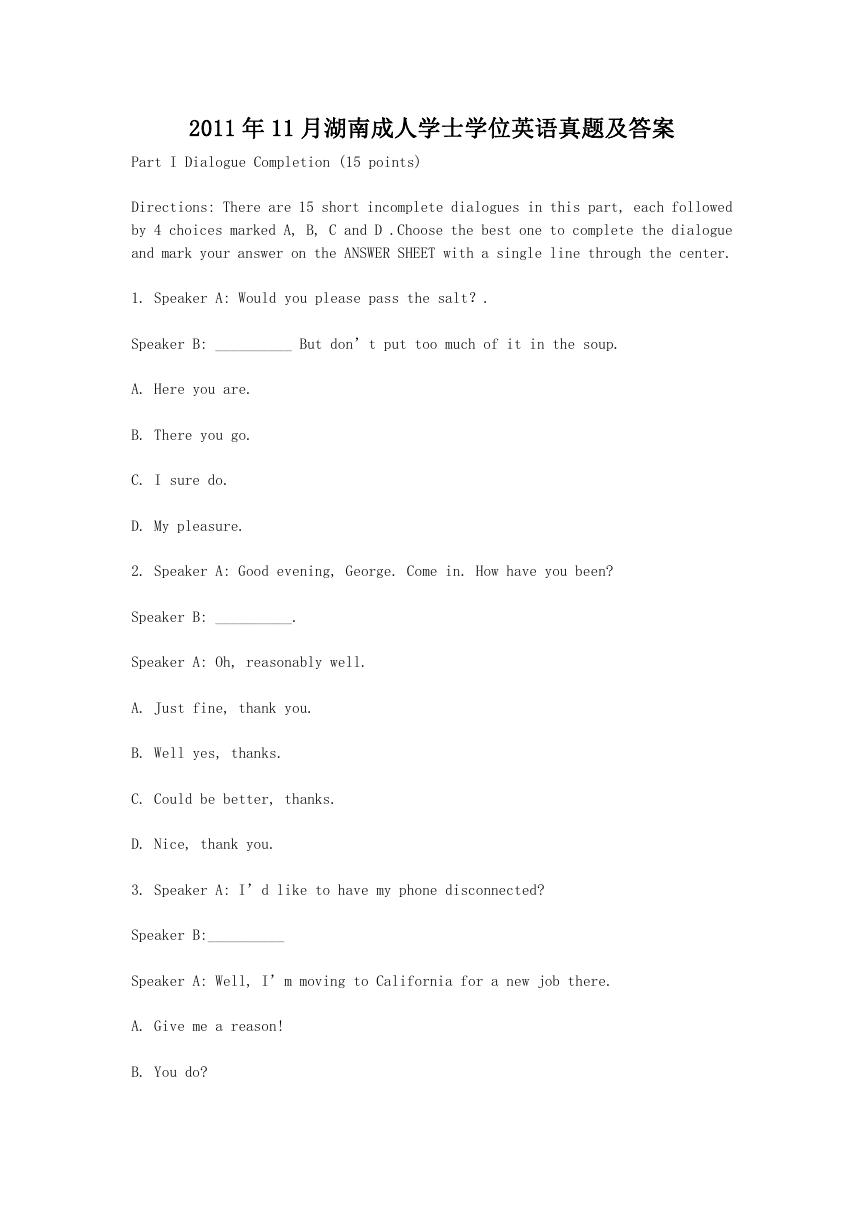
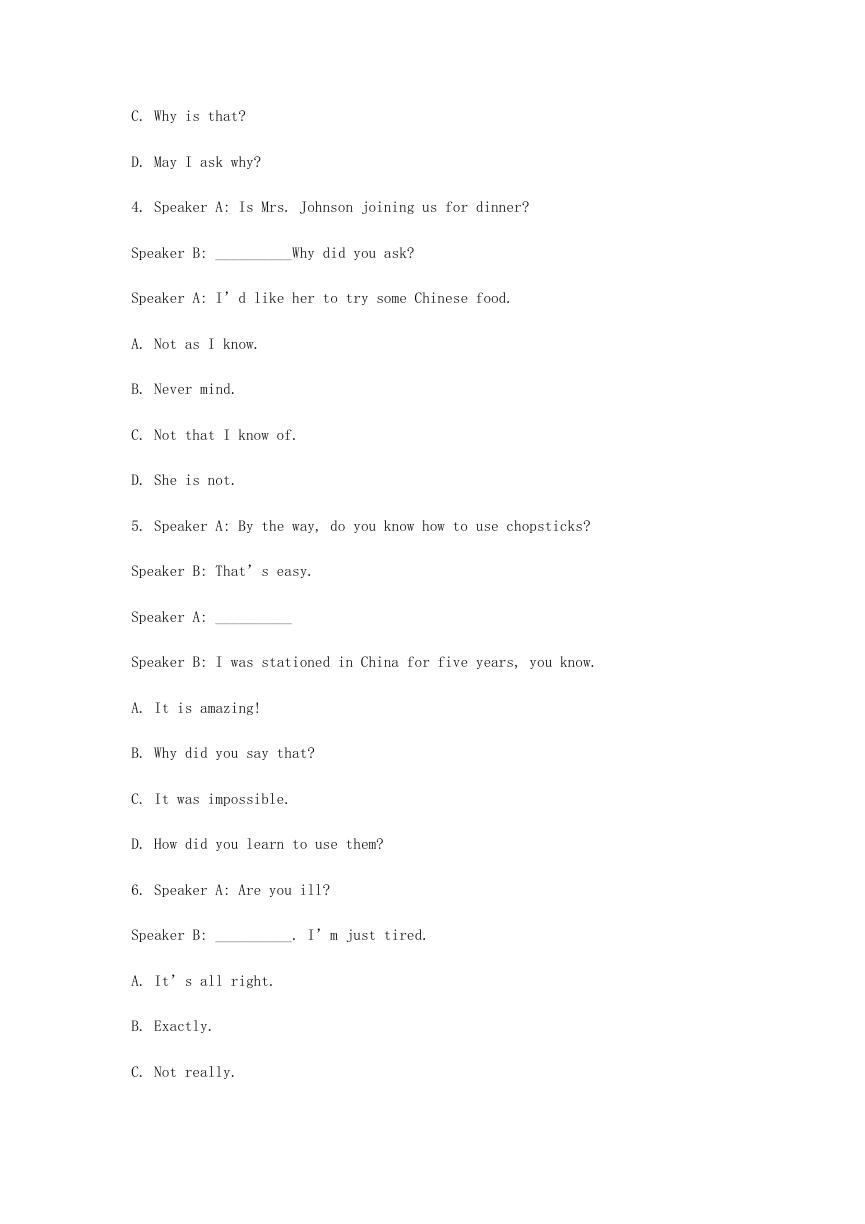

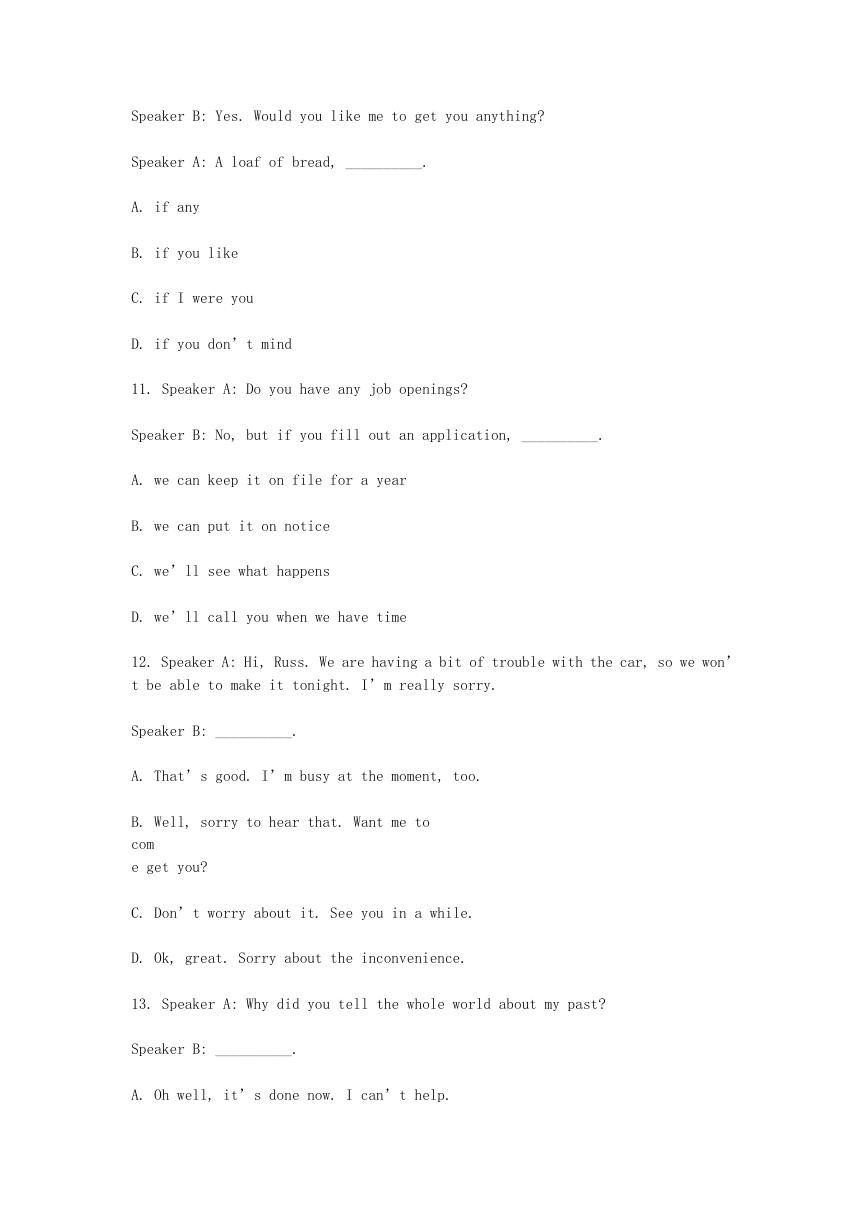
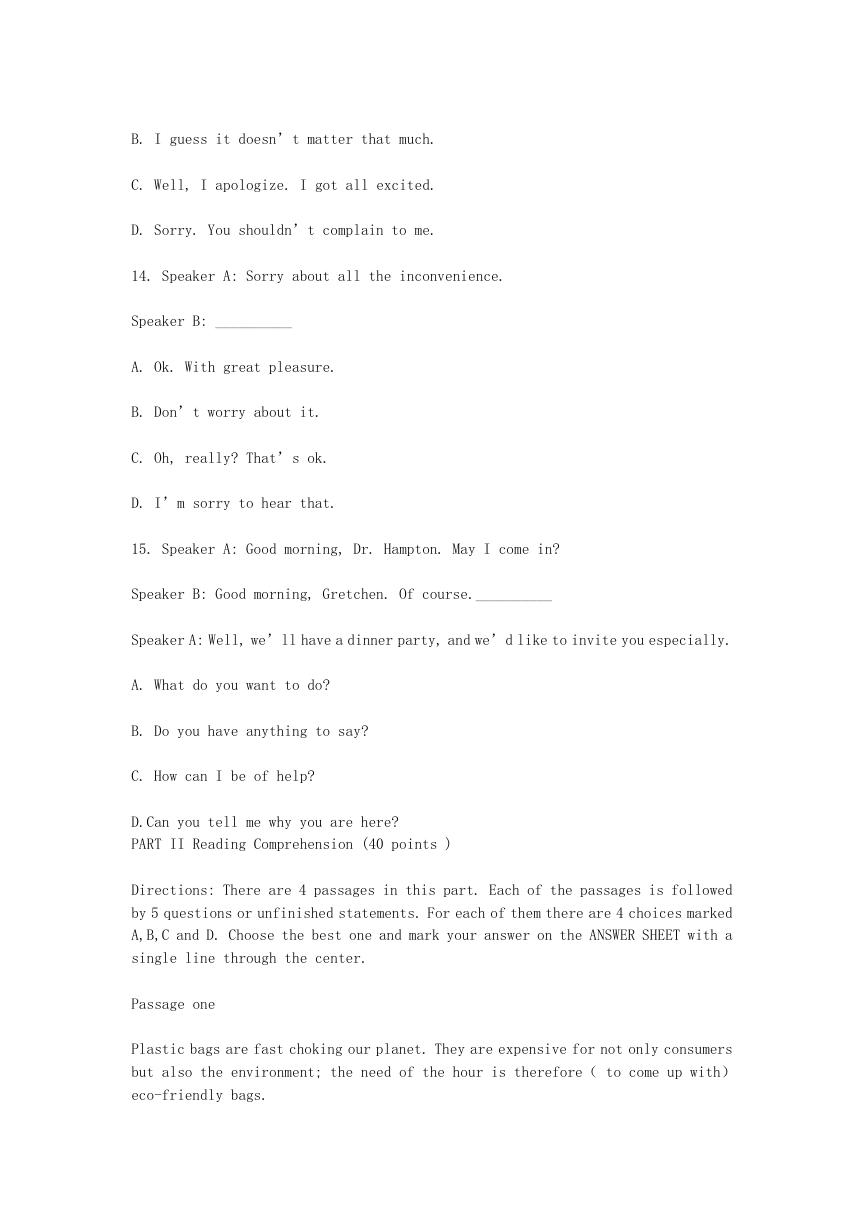
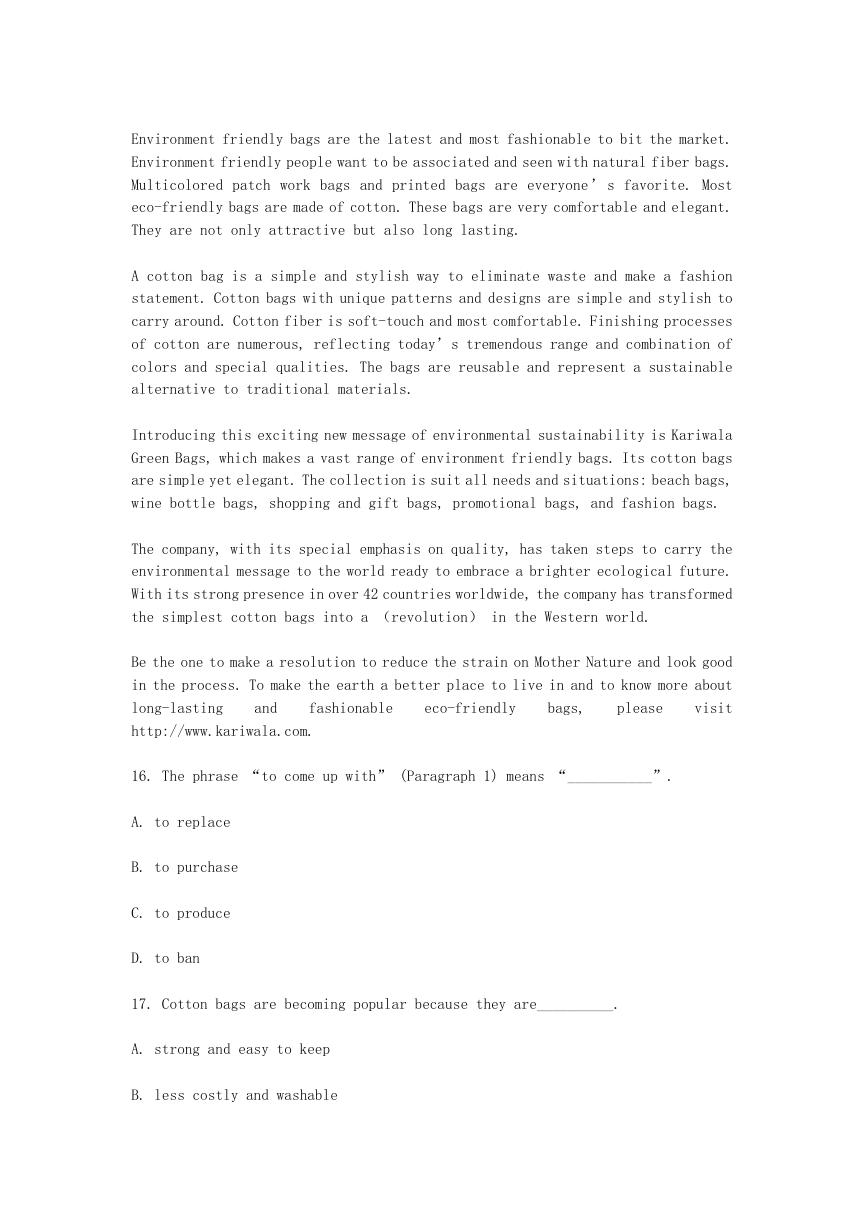
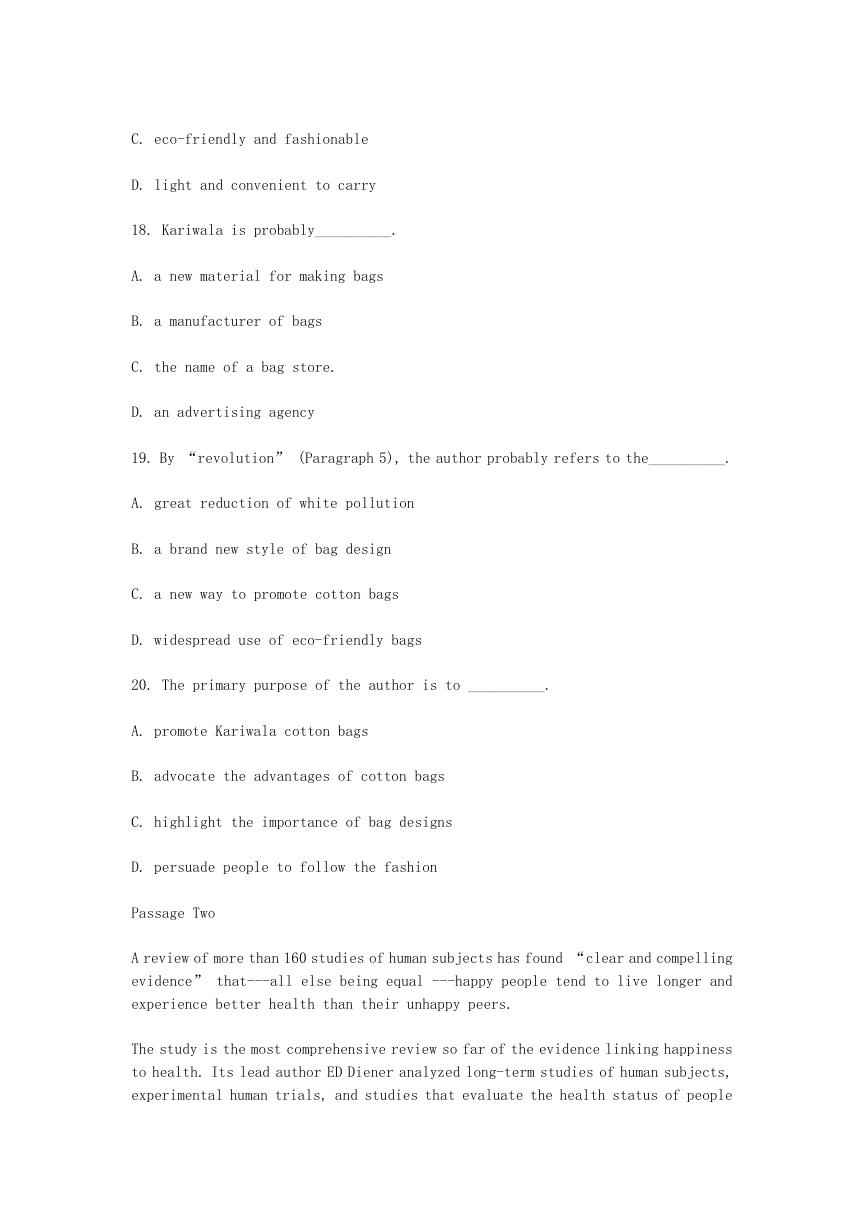
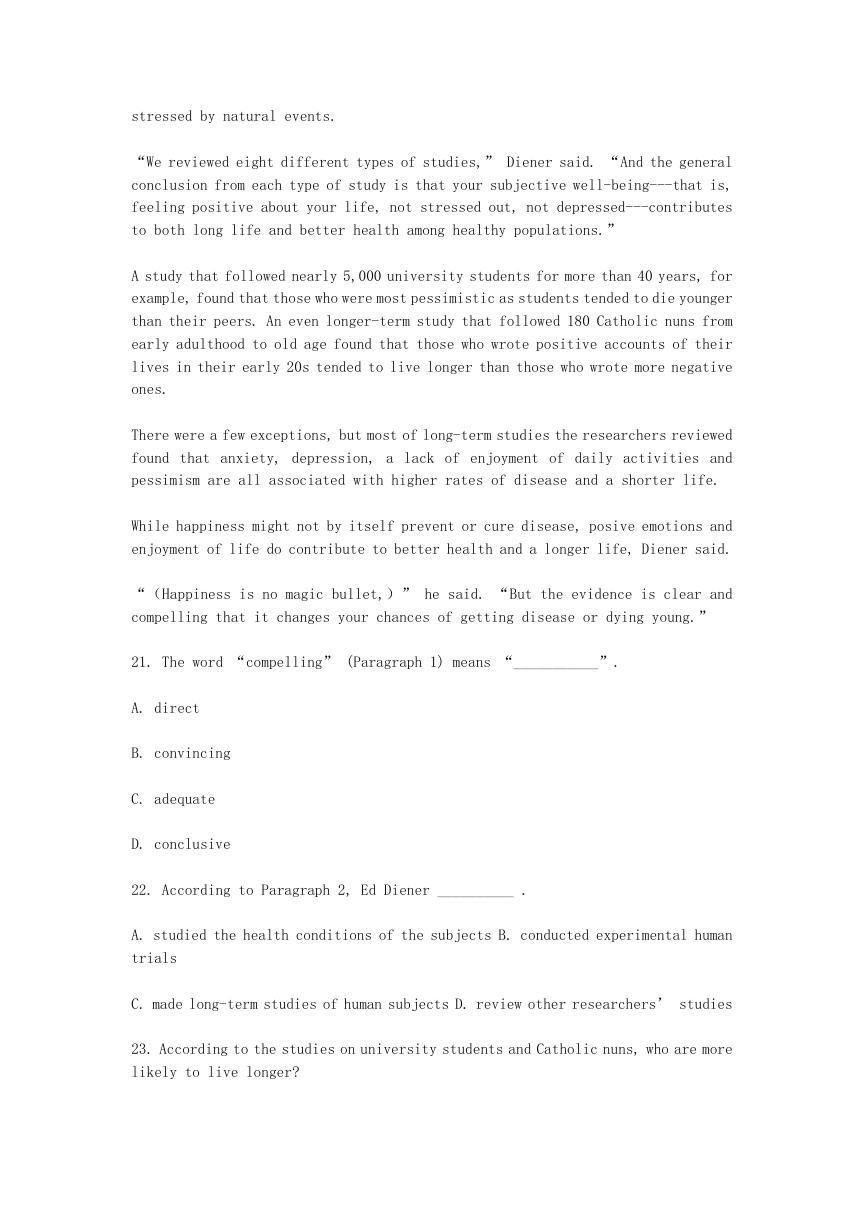








 2023年江西萍乡中考道德与法治真题及答案.doc
2023年江西萍乡中考道德与法治真题及答案.doc 2012年重庆南川中考生物真题及答案.doc
2012年重庆南川中考生物真题及答案.doc 2013年江西师范大学地理学综合及文艺理论基础考研真题.doc
2013年江西师范大学地理学综合及文艺理论基础考研真题.doc 2020年四川甘孜小升初语文真题及答案I卷.doc
2020年四川甘孜小升初语文真题及答案I卷.doc 2020年注册岩土工程师专业基础考试真题及答案.doc
2020年注册岩土工程师专业基础考试真题及答案.doc 2023-2024学年福建省厦门市九年级上学期数学月考试题及答案.doc
2023-2024学年福建省厦门市九年级上学期数学月考试题及答案.doc 2021-2022学年辽宁省沈阳市大东区九年级上学期语文期末试题及答案.doc
2021-2022学年辽宁省沈阳市大东区九年级上学期语文期末试题及答案.doc 2022-2023学年北京东城区初三第一学期物理期末试卷及答案.doc
2022-2023学年北京东城区初三第一学期物理期末试卷及答案.doc 2018上半年江西教师资格初中地理学科知识与教学能力真题及答案.doc
2018上半年江西教师资格初中地理学科知识与教学能力真题及答案.doc 2012年河北国家公务员申论考试真题及答案-省级.doc
2012年河北国家公务员申论考试真题及答案-省级.doc 2020-2021学年江苏省扬州市江都区邵樊片九年级上学期数学第一次质量检测试题及答案.doc
2020-2021学年江苏省扬州市江都区邵樊片九年级上学期数学第一次质量检测试题及答案.doc 2022下半年黑龙江教师资格证中学综合素质真题及答案.doc
2022下半年黑龙江教师资格证中学综合素质真题及答案.doc